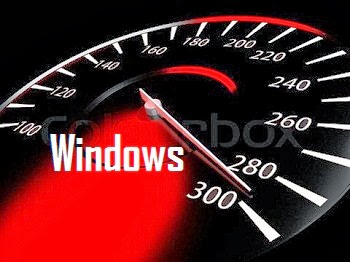Is your home computer running slow? There are many possible reasons why your home computer is running slow. Here are some tips you can use to help get your PC back up to speed.
Windows Operating Systems are very powerful, serving good interface, vast compatibility of software, availability of various tools etc. But after a period, you might feel that your Windows PC is not booting as much fast as it was booting earlier when your Windows was fresh.
Windows Operating Systems are very powerful, serving good interface, vast compatibility of software, availability of various tools etc. But after a period, you might feel that your Windows PC is not booting as much fast as it was booting earlier when your Windows was fresh.

If your Windows PC is taking comparatively more time to boot then earlier, you are required to optimize your Windows booting time. Here are some tips that will help you to make your Windows Boot faster.
1. Disable Unnecessary StartUp Programs
When you install software, many of them create a startup entry. So, as the Windows starts, these applications also starts their own services which increases your computer’s startup time. So, you need to minimize the number of programs available in startup entries. To do this:
Step 1: Type msconfig in "Run" dialogue box of Windows (for windows 8.1, you can search for msconfig from search bar). Hit enter. It will open System Configuration Utility.
Step 2: Navigate to "Startup" tab. Here you can see all the apps/services which automatically runs whenever your Windows start. So, you can disable all the unnecessary apps which are not required to run at startup. For example, you can disable IDMan (Internet Download Manager), BitTorrent, Adobe ARM etc. as they are not required to run at startup.
Step 3: Remove tick from unnecessary services at the startup tab. Apply the settings and restart your PC.
2. Changing Boot Timeout
From "msconfig", you can change boot timeout from default 30 seconds to 10 seconds. Since what it does is specify how long Windows may display an automatic menu, such as the Startup Repair menu. Also, tick "No GUI Boot" option. It’ll disable showing graphics (windows logo) at boot time.
These two options will stop some services which save Windows boot time and hence make your boot time fast.
3. Scan for Malware & Viruses
Malware and Viruses, while decrease performance of your PC also effects your PC’s booting time. So, its better to scan your PC for viruses using a good antivirus program. It is recommended to perform a Boot-time scan because it is much more effective then custom, quick or full system scanning.
4. Clean Your Desktop
When Windows starts, you might observe that first desktop wallpaper loads then taskbar and finally desktop shortcuts and files. The number of desktop shortcuts directly affect Windows starting time because Windows is required to check and validate if all the shortcuts are connected with correct files and services which takes some time.
So its better to clean your desktop now.
5. Disable Unnecessary Services
Right click on My Computer, select ‘manage’ from the context menu. You will see ‘Computer Management’ window screen. Now, navigate to Services and Applications > Services. Here you’ll find a long list of services Windows runs. Many of them are unnecessary.
By observing there Startup Type, you’ll see many of them are Enabled and Many Runs Automatically.
So, it is recommended to disable all unnecessary services for your system for example, Ask Update Service, Google Update Service. And, if not possible, try to set there startup type from Automatic to Automatic (Delay Start). So, these services will run after your Windows starts and hence will not increase Windows booting time.
6. Cleaning The Registry
Cleaning your Windows Registry will clean up some junk entries from the Registry. As registry may contain lot of extraneous files, cookies, index files, log files, and other clutter so cleaning them will ultimate lead to a relatively faster boot time. To do this, you can make use of many available free tools like Ccleaner.
7. Measure Your Boot Time
BootTimer, a software from Planetsoft is your best companion to measure your computer’s boot time. It is a portable application. so, you’ll not required to install any new software on your system.
All what BootTimer does is, when you open the application, it will prompt you to restart your PC. When you’re ready, click OK for the prompt and your PC will restart. As your PC start booting, BootTimer start a stopwatch which shows you the total boot time taken by your PC. Using this software, you can check the effectiveness of above mentioned tips.
Comments
Post a Comment